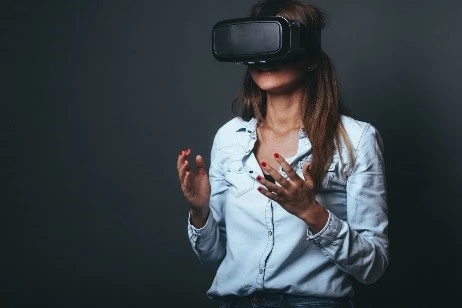
Partner Article
THE CHARITIES LEVERAGING VIRTUAL REALITY TO ENGAGE AND INFORM
When you think of the word ‘technology’ and the organisations who are leveraging this to achieve their goals and objectives – charities may not immediately spring to mind.
However, with the increasing popularity of virtual reality, and its power for storytelling, we are starting to see more and more charities use this type of technology to help raise awareness of their cause and engage with large audiences.
Three organisations who are using VR affectively, and paving the way for other charities with the use of virtual reality, are Smile Train, Alzheimer’s Research UK, and the United Nations.
SMILE TRAIN
Smile Train - the international children’s charity which provides 100%-free cleft repair surgery and comprehensive cleft care to children in over 85 developing countries - is leveraging virtual reality technology to bring awareness to children in need of cleft repair, by highlighting their day-to-day experiences.
In western countries such as the UK, children born with cleft lips and/or palates are typically treated on the NHS. As a result, the general public may not always be aware of the serious health implications and social stigma a cleft can have on a child’s life if left untreated – an issue which Smile Train wants to address.
The charity has therefore developed two 360° virtual reality videos, which helps to bring the work of their local in-country medical partners to life. Viewers are offered a glimpse into the world of two Indian children, Vikas and Nisha, who are living with untreated clefts, and follow them on their journey as they each receive life-changing surgery.
Smile Train’s use of VR technology allows them to reach people not only in the UK, but all over the world, helping them to better understand the many challenges children with untreated clefts may face.
To view Smile Train’s virtual reality videos, follow these links: Vikas - http://bit.ly/2FOgntA / Nisha - http://bit.ly/2FOgntA
ALZHEIMER’S RESEARCH UK
Alzheimer’s Research UK, one of the country’s leading dementia charities, has recently launched a cardboard VR app called ‘A Walk Through Dementia’ to enhance understanding and empathy for those living with the condition.
The app is designed to put users in the shoes of someone living with dementia, allowing them to experience and understand what everyday life can be like. For example, within the videos, the charity invites users to go supermarket shopping, take the ingredients they have bought home with them, and make a cup of tea for their family. These ‘easy’ tasks, however, prove to be quite challenging due to all sorts of symptoms which dementia patients face - including memory difficulties, reading difficulties, and anxiety. The video therefore demonstrates to viewers how easy, everyday tasks can be problematic and stressful for people living with dementia.
The technology has also helped to raise more awareness of the condition itself. Dementia is a condition caused by diseases, most commonly Alzheimer’s, which damage different areas of the brain leading to a variety of challenging symptoms. By following the story that Alzheimer’s Research UK is trying to tell through the footage – viewers are engaging more in the topic of memory loss and learning more about the condition overall.
For further information on ‘A Walk Through Dementia’, take a look at the following link: http://bit.ly/2Dq2R0T
UNITED NATIONS
In 2015, the United Nations launched its first ever VR video called ‘Clouds over Sidra’, which follows the life of a Syrian refugee girl. The technology was created and released to help generate greater empathy for Syrian refugee’s, and to offer a new perspective on the refugee crisis.
Filmed in Jordan, home to thousands of Syrian refugees fleeing conflict and devastation, the video tells the story of Syrians living in a refugee camp and follows a 12-year-old Syrian girl named Sidra. Through engaging in the VR footage, viewers learn of Sidra’s undesirable surroundings, and are exposed to her every day struggles.
We often forget the challenges that are faced by so many people around the world – particularly within developing countries. However, looking at how these charities have leveraged VR technology to communicate with their audiences and shine the light on global issues that still need to be resolved - it’s exciting to think of the advancements and change that charities will be making in the future, following the development of newer, and even more exiting, technologies.
To view more information on United Nation’s virtual reality video ‘Clouds over Sidra’, follow this link: http://bit.ly/2rh3kOd
This was posted in Bdaily's Members' News section by George May .








 Ready to scale? Buy-and-build offers opportunity
Ready to scale? Buy-and-build offers opportunity
 When will our regional economy grow?
When will our regional economy grow?
 Creating a thriving North East construction sector
Creating a thriving North East construction sector
 Why investors are still backing the North East
Why investors are still backing the North East
 Time to stop risking Britain’s family businesses
Time to stop risking Britain’s family businesses
 A year of growth, collaboration and impact
A year of growth, collaboration and impact
 2000 reasons for North East business positivity
2000 reasons for North East business positivity
 How to make your growth strategy deliver in 2026
How to make your growth strategy deliver in 2026
 Powering a new wave of regional screen indies
Powering a new wave of regional screen indies
 A new year and a new outlook for property scene
A new year and a new outlook for property scene
 Zero per cent - but maximum brand exposure
Zero per cent - but maximum brand exposure
 We don’t talk about money stress enough
We don’t talk about money stress enough